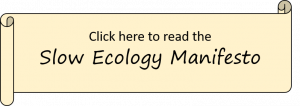Slow Ecology
Slow Ecology is about reflecting on our ecological values
It involves:
1) Taking time to reconnect with nature and letting that slow knowing, in combination with science, guide our most effective actions
2) Reflecting deeply to ensure environmental technologies are aligned with our values
3) Engaging in deliberative community-based approaches to solving interlinked environmental and social problems





Slow Ecology Moot [postponed due to pandemic]
We are considering to host an inaugural ‘Slow Ecology Moot’, with a programme including interactive deliberation sessions on: values in ecology, technology and ecology, philosophy of conservation, impacts of ecological research, and paradigms for 21st century ecology. There will also, of course, be ample time for exploring nature through guided field trips, good music and (slow) food. If you are interested in joining as a participant or are interested in potentially leading one of the deliberative sessions or some other aspect of the event, please do get in touch.
Slow Ecology FAQs:
Q. Is slow ecology just for professional ecologists?
A. Certainly not. Ecological understanding is an essential skill which should be taught in every school. We need everyone on the planet to be reflecting on how their actions impact the natural world and other people. Humanity won't be saved from catastrophic impacts by a handful of professional ecologists. It needs widespread shift across society to a more ecological mindset.
Q. Is slow ecology the same as 'deep ecology'
A. There are some similarities with deep ecology (just as slow rivers run deep), especially around the critical reflection on values and attitudes. Also, there is similarity with ideas like 'Critical Science' (Ravetz, 1971) and 'Public Interest Science' (Bereano, 1976). But these and deep ecology have tended to be developed by lone thinkers, whereas slow ecology is about building a community movement. Just like the slow food movement there is a communal joy and pleasure in this process.
Q. Do we have time to slow down when the world is in such a critical state?
A. We should have started a long time ago, that can’t be denied. But never has it been more important to slow down and reflect on our trajectory as a global society. Our modern technologies and behaviours harm every aspect of the environment —the oceans, the atmosphere, the soils—on which our very existence depends, and the pace of change is only getting faster. It is urgent to critically assess our activities in terms of their wider social and environmental impacts.
Q. Is slow ecology for students?
A. Absolutely, students are the future of ecology! Get together with others to debate slow ecology ideas such as: "Should we put a monetary value on nature? Is the natural capital paradigm healthy for society? What are genuine solutions to the climate and biodiversity crises that address real root causes?" Ask challenging questions of yourself and those in authority.
Interested to follow up?.... write to @Tom_H_Oliver on twitter (or email me, see bio page here)
Related articles:
Selected articles featuring slow ecology ideas:
- A new campaign wants to redefine the word ‘nature’ to include humans – here’s why this linguistic argument matters The Conversation
- Nature: how do you put a price on something that has infinite worth? The Conversation
- The age of the individual must end – our world depends on it The Guardian
- Green Man, The Idler magazine
- Could teaching about the environment actually be at odds with protecting nature? ACU Review,
- Climate crisis: we are not individuals fighting a faceless system – we are the system that needs to change The Conversation
- Is the concept of 'natural capital' useful? - extract from Debating Nature's Value
- For a more in-depth treatment of these ideas and more see THE SELF DELUSION
"No problem can be solved at the same level of consciousness that created it" - Albert Einstein
See more quotes relevant to slow ecology here

